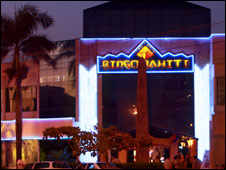Russian casinos take root in Bolivia
January 14, 2009 - BBC News
By Annie Murphy
 (left) Bolivia has seen a rise in the number of casinos and bingo halls
(left) Bolivia has seen a rise in the number of casinos and bingo halls
Santa Cruz --- Step into one of Bolivia's 15 Bingo Bahiti gambling parlours, and you are struck by the kitsch: brilliant neon signs, slot machines labelled in English, and a bingo hall full of patrons.
Bingo Bahiti is a popular nightspot - and it is a Russian import.
A law to limit gambling drastically is due to take effect in July in Russia. Approved during Vladimir Putin's presidency, the measure will restrict casinos to four remote regions.
So in a scramble for markets, Russian-owned gambling businesses have been eyeing the possibilities in this Andean nation.
"With Russia tightening its gambling laws, it's going to affect a lot of casinos. So it's natural that they would look to Bolivia, because it's a virgin country in terms of investment," said Jose Maria Penaranda, who runs the Bingo Bahiti chain of casinos.
"It's a good opportunity," Mr Penaranda said, speaking in his office above the giant Bingo Bahiti casino in the eastern city of Santa Cruz.
Mr Penaranda is Bolivian, but the majority shareholder of Bingo Bahiti is Russian-owned Ritzio, one of the world's largest gaming operators.
He said that Ritzio won the bid for a direct contract with the Bolivian government five years ago. Since then, they have been expanding across the country.
 (left) Bingo Bahiti's onwers say their casinos are well regulated
(left) Bingo Bahiti's onwers say their casinos are well regulated
The group currently owns 15 casinos, and is set to open two more mega-casinos this year: one in Santa Cruz, and the other in El Alto.
The two cities are separated by about 800km (500 miles), but are worlds apart. El Alto, a sprawling township home to many indigenous people, is located on the cold, high plains of the Andes, while more prosperous Santa Cruz lies in the tropical lowlands.
"Bahiti is for everyone," said Mr Penaranda. "Everybody just loves this place."
Boon or blight?
Mr Penaranda said that Bingo Bahiti adheres to all gambling laws, brings in foreign investment, and also does significant charity work.
But Bahiti is only one of many casinos here. Officials are concerned about a proliferation of other smaller, illegal Russian-owned casinos and by gaps in the current legislation.
"The current system is a mess," said Carlos Bruno, the director of the National Lottery in Santa Cruz, which oversees gambling businesses.
"Once you get one licence, there is no limit to how many casinos you can open," he said.
"We haven't given out a single new licence since the [Evo] Morales government came into power, yet new casinos are opening all the time. There is no control."
 (left) Critics fear unrestricted gambling is bringing a wave of crime
(left) Critics fear unrestricted gambling is bringing a wave of crime
According to Mr Bruno, Bolivia's gambling regulations are full of other loopholes. He said that strict banking privacy terms and rampant corruption make it difficult to find out - let alone prosecute - when casino operators break the law.
"We know that this is probably connected to bigger crimes, and it's changing our city for the worse, but no one is willing to take it on," he said.
Santa Cruz District Attorney Hector Cornejo is one of the few people fighting against unregulated foreign gambling. He said the influx of foreign casinos is part of a much bigger problem.
"Basically Santa Cruz has become a little Las Vegas, and foreign capital - mostly from Russia and Brazil - is flowing in, from mafias and other people tied to illegal activities like money laundering," said Mr Cornejo.
Drug profits
There are a variety of ways money can be laundered through casinos; the most common is to use funds to buy chips, and then turn around and cash them back in. Dirty money becomes a clean cheque that can be deposited in any bank.
And that is only the start. Mr Cornejo pointed out that Bolivia is still a cocaine-producing country, and that large quantities of the drug - and profits - pass through Santa Cruz en route to the Brazilian border. He said it fuels money laundering, as well as other criminal activities.
"Everything is related: arms trafficking, money laundering, casinos, human trafficking, prostitution, fraud, and organised mafias," said Mr Cornejo.
 (left) Russia's gambling industry is setting its sights far away from Moscow
(left) Russia's gambling industry is setting its sights far away from Moscow
"Now you have dead people turning up daily," he said, referring to a recent series of murders carried out by hired assassins.
He said that if something does not change, Santa Cruz will quickly become a "no man's land".
Nonetheless, Bolivians are continuing to be attracted to Russian-owned bingo halls, licensed or not.
Seventy-one-year-old Eloisa Montealegre was playing bingo on a recent Friday night, as she does seven days a week.
"This has become my hobby," she said. "I don't know about about Russians. All I know is that without bingo, where am I going to have my fun?"